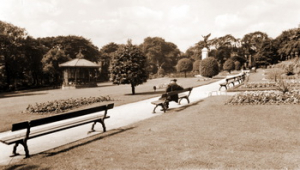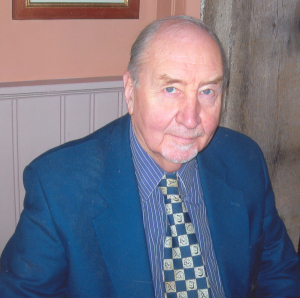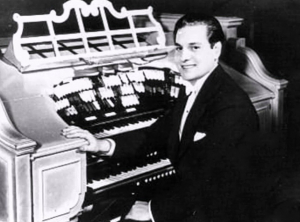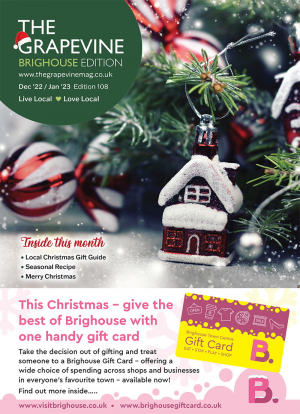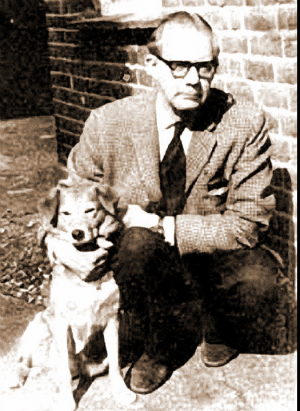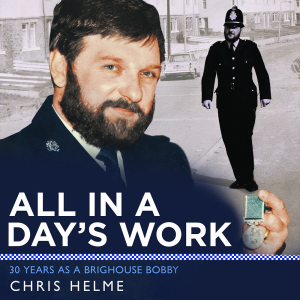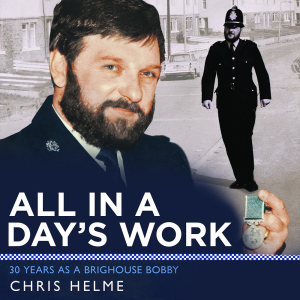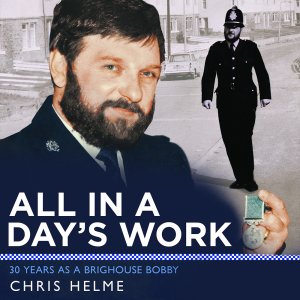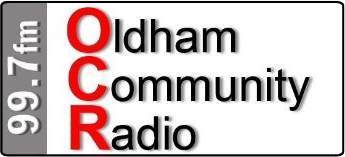
Talk Subjects
Chris Helme
GEOFFREY BRAND OBITUARY
Geoffrey Brand was born in Gloucester in 1926, where his mother’s family were part of the backbone the local Salvation Army, so he enrolled at an early age. But it was not the spiritual nature of his Salvationist activities that inspired Geoffrey but rather his daily involvement in the music making. He very much wanted to play the cornet, despite being put to the baritone when he as eight.
The SA Band was a huge part his family life : one of his uncles, Herbert Cullip, was a very fine trombone player, his father and his brother Lewis both played, and Uncle Fred was Bandmaster. But he also enjoyed sport and was a keen footballer (rather frowned upon in SA circles) and enjoyed watching the Gloucestershire cricketing legend Walter Hammond with his father, Ted, with whom he enjoyed a close relationship.
Practising three hours a day…
The 1930’s Depression meant that musical opportunities seemed out of reach but the Second World War changed Geoffrey’s life. When he was 14 many young men left Gloucester SA Band to join up. The depleted Band welcomed five excellent brass players from a nearby RAF Station, one of whom was William Overton, Principal Trumpet with the BBC Symphony Orchestra and a Professor at the Royal Academy of Music. Geoffrey was given his cornet as Overton had spotted his talent and offered to teach him free of charge, although as his teacher stayed to tea after the weekly lesson it seemed to his young pupil that the family’s meagre egg ration never seemed to go as far as it had previously. But it was a good investment, as Overton inspired his pupil who decided that he wanted to be a professional trumpet player. He started practising for three hours a day, much to the vocal consternation of the neighbours. With the determination for which he was well-known later in life he soon became an outstanding Cornet player.
In 1944 Overton encouraged Geoffrey to apply for a Trumpet scholarship at The Royal Academy of Music (RAM). He was successful but his Scholarship was put on hold as he was drafted into the Army where he joined the Band of the Royal Army Service Corps, and met many seasoned professional musicians. When was discharged to take up his Scholarship he had already experienced what being a professional player entailed. He now studied with the great George Eskdale, who, Geoffrey said, taught him ‘the importance of sound’, which guided his approach to music- making throughout his life.
Geoffrey meets Violet…

It was whilst he was a student living in Lewisham with the Overton family that he met his future wife, Violet Boughton, who was studying to be a teacher at nearby Eltham Teacher Training College. He recalled that one Saturday afternoon he came back to tea after watching Charlton Athletic football club and found that a pretty girl from Canterbury there.
There was always the suspicion that some SA matchmaking went on by Major Will Fryer (the Officer at Lewisham Corps and Violet’s Uncle) but Geoffrey and Violet got on so well that they married in 1950.
Geoffrey was now working as a freelance trumpet player. He had to take work as it was offered and on the very day he and Violet arrived back from their honeymoon he received an invitation to join the Royal Philharmonic Orchestra for a tour of the USA under Sir Thomas Beecham. Wonderful news - but the tour started within a fortnight and was to last for 3 to 2 months! Whether to accept or not so soon after their marriage might have presented a dilemma, but Violet immediately said ‘of course you must go’ and throughout their long and happy marriage they always encouraged each other to take opportunities as they arose.
Playing nightly concerts across in the US with the finest British players…
The Beecham USA tour turned out to be a seminal experience for Geoffrey, playing nightly concerts across the country with the finest British players. It led him, at the age of 24, to decide that what he really wanted to do was not to play - but to conduct. Throughout his life his advice to young people was ‘Decide what you really want to do – then do it’.
However, knowing what he wanted to do was one thing: achieving it was another, especially as a conductor. He took a permanent job in the trumpet section at the Royal Opera House, staying for five years as he worked out how to make the leap from the high income he enjoyed as a player to starting out again as a conductor with no financial support. By 1955 he had two young children too, Michael and Gill.
Geoffrey joins the BBC...
In the 1950’s employment as a BBC Radio producer also allowed the pursuit of other musical activities. In 1955 Geoffrey put his trumpet away, became a Producer for the BBC Light Programme, lost half his income, and moved the family down the hill in Rickmansworth, to a rather smaller house which ‘needed quite a lot doing to it’. It was the first of many family moves and although Geoffrey, ever the perfectionist, learned to hang wallpaper straight over time, his children Michael and Gill learned that it was better to be elsewhere during this painstaking parental activity.
During his 12 years producing at the BBC Geoffrey widened his musical horizons, commissioning many fine composers and arrangers including Malcom Arnold, Gilbert Vinter, Ron Goodwin and Robert Farnon. He ran the annual BBC Light Music Festival at the Royal Festival Hall, as well as producing Friday Night is Music Night.
Conducting the John Dickinson Aspley Band…

Simultaneously though he set about training himself to be a conductor, taking the John Dickinson Band at nearby Hemel Hempstead. As a top class trumpet player himself he quickly improved the sound and the ensemble and the band started winning contests. In 1963 he was invited to take Crookhall Colliery Band to the National Brass Band Championships Finals at the Royal Albert Hall and a year later he took the Cory Band to the same event. Now Geoffrey was searching for the springboard to take him out of the BBC and into world of full time conducting. He was determined to make the leap - the question was how?
By 1967 the BBC management split the rather anachronistic Light Programme into Radio 1 and 2. The broadcasting of 'Light Music’ became was a casualty. For Geoffrey it was time to leave the Corporation.
Geoffrey – Black Dyke Mills - 1967 what a performance…


Fate now took a hand as Black Dyke Mills Band were booked for an imminent Radio 3 broadcast but were without a professional conductor. As Geoffrey was about to leave, the BBC and the Band agreed that he could be engaged to conduct this important session. There must have been a chemistry at rehearsals, as afterwards Resident Conductor Roy Newsome invited Geoffrey to take the Band to the Royal Albert Hall Championship Contest Finals in October. This huge brass band event at the Royal Hall was oversubscribed three times over in those days, and the over full Hall was a musical cauldron of expectancy throughout the day.
Unusually, the Black Dyke had not won there for a few years. It was a pivotal moment for them – and Geoffrey. However, he achieved his first conducting objective right away, winning the Royal Albert Hall Band contest with Black Dyke on October 14th 1967 with a performance of Eric Ball’s new Test-piece ‘Journey into Freedom’. Many people present on that day have since described the electric and emotional effect of that performance. It lit a fuse under his brass band conducting career. He was 41 and on his way.
Following his contest win Geoffrey was appointed as Professional Conductor of Black Dyke and now had the opportunity to perform and record repertoire from new composers as well as the rich brass band musical heritage of previous years. Many have described this period as a ‘Golden Era’ and working with Roy Newsome, they all relentlessly pursued the highest performance standards. They created a legacy of fabulous recordings. Concerts of newly commissioned brass band works from mainstream composers followed at prestige Festivals, and on BBC Radio.
The life as a music publisher…
As a publisher Geoffrey started to revitalise the R. Smith Music catalogue with works from new young composers such as Edward Gregson, Philip Sparke, and Gareth Wood and also arranged classical works for publication himself. Before leaving the BBC he and Violet knew that they had to make plans to support themselves during the precarious financial life of a freelance conductor. At this time the owner of the prestigious brass band publishing company, R Smith & Co and the premier weekly journal ‘The British Bandsman,’ H F B ‘Eric’ Iles, son of John Henry Iles, decided to sell both companies.
After a number of lengthy meetings with Eric Iles at the Café Royal, at which apparently the refreshment accompanying the drinks was limited to peanuts, Geoffrey and Ray Dutfield, his tenor Horn playing, Gloucester SA boyhood friend, (and now a high flying businessman) acquired the two companies with their wives. The families had kept up a close friendship.
So as well conducting Black Dyke in the autumn of 1967 Geoffrey started running the two companies from the premises at 210 The Strand, which by then was magnificent in name only, Situated as it was above the Express Diary tea bar. Geoffrey became Music Editor of R Smith & Co and Editor of the British Bandsman, although in reality Violet was the Co -Editor, as Geoffrey was happy to acknowledge.
Geoffrey now owns the National Brass Band Championships…
He also followed Denis Wright as Music Director of the National Youth Brass Band of Great Britain. A few years later become Musical Director of the National Brass Band of Scotland, a position he held for 20 years. Working with young people was always important to him and
many young players who attended the courses under his leadership have described how much these broadened their musical horizons. He remained an active Advisor and Trustee of the National Youth Brass Band of Great Britain until well into his eighties.
In 1972 Geoffrey and Ray Dutfield were offered the opportunity to buy the National Brass Band Championships. They acquired it and brought in the very able Peter Wilson from Scotland as administrator. This offered an exciting challenge for Geoffrey the musical entrepreneur. But for Geoffrey the conductor it may have been a step too far.

Typically, he made some early bold decisions. In 1973 he introduced percussion into the Bands competing in the Royal Albert Hall Championship Section Contest and also decided to hold the Finals of the Youth Contest there too, replacing the early 5pm concert. He and Peter Wilson wanted young players to experience playing in the wonderful old hall.
But now, as an owner of the three most influential Companies in the world of brass band music Geoffrey was ultimately responsible for the rules of engagement at the fiercely competitive National Brass Band Championship contest, which were the choice of music, and the adjudicators. The difficulty in the eyes of some was that Geoffrey was likely to be conducting Black Dyke at the contest itself. Something had to go.
Owing to the pressures of work Geoffrey and Black Dyke Mills part company...
He quickly decided that he had no alternative but to resign his position as the Professional Conductor of Black Dyke which he did with great regret. To clear the way for Geoffrey to resume his conducting career the Brand and Dutfield families decided to sell the British Bandsman and National Championships, retaining publishers R Smith & Co. Geoffrey always knew what he ‘really wanted to do’. He had probably strayed too far from his vocation.
During the next 10 years he was offered the opportunity to work with many of finest British brass bands, including GUS, Brighouse and Rastrick, Grimethorpe, Fairey, and many more. But the relationship of any conductor with a tightly knit band of players always has an element of chemistry. With Geoffrey there sometimes sparks in the process – not every experiment was completely successful.
Geoffrey and Violet celebrate their anniversary on the Trans-Siberian Railway...
In 1985 he ceased to conduct at band contests as by now he needed to make time for many invitations to conduct and lecture in Europe, Japan, New Zealand and particularly Australia. Violet came when she could although by the 1990’s she was much in demand as a lecturer and writer on dyslexia. They always enjoyed travelling for recreation as well as work: when they married in 1950, Geoffrey had said to his new wife ‘if you stick it out with me for 25 years I‘ll take you on the Trans Siberian Railway’. She did indeed ‘stick it out’ and in 1975 for their Silver Wedding they went on this exciting journey behind the Iron Curtain. It was only after the train had left Moscow that they were told that they could not obtain any food on board without prepaid Vouchers – which they had neglected to purchase. And the journey lasted a week! Travelling with Geoffrey was always fun, if occasionally perilous!
By the mid-1980’s R Smith & Co had moved physically to Wingrave in Buckinghamshire and sideways as publishers. This came about as a result of Geoffrey meeting the marketing director of an expanding USA publisher whilst he was in Japan, who told him that they were very interested in distributing British Wind Band Music to the very substantial market there. Geoffrey very excited by the prospect and agreed in principle to license 25 new pieces a year for USA distribution. This was a great opportunity. The only drawback was that R Smith & Co did not actually publish any Wind Band music. Now Geoffrey was in his sixties, but with his son Michael now involved, they accepted the challenge of creating a new Wind Band catalogue from scratch.

Geoffrey was able to invite many of his old BBC friends to write and they also set about finding new young composers. The family business grew considerably, with Ken Kendall, who had joined back in the days in the Strand, still a much respected and valued member of the team.
Retirement was not in Geoffrey’s DNA...
Geoffrey’s appetite for accepting foreign conducting opportunities did not diminish. In fact he was able to promote the new publications personally – by performing them. The idea of retiring simply did not cross his mind and he continued to conduct, arrange publish and travel well into his eighties collecting many awards. Hard work, determination and enthusiasm enabled him to realise his huge talent as a musician. He said that a performer must always aim to produce their best – whatever the occasion. He was a perfectionist. From the podium he would persuade and inspire and cajole musicians to give their best. That is what he saw as a conductor’s role – serving whatever music was on the music stands in front of them. Composers were grateful that their new work would get a fair hearing, which he always regarded as the conductor’s first priority.
Here is an interesting interview with Geoffrey in USA in 2005 - https://www.youtube.com/watch?v=jek4lYjCIQw
Many who played for him throughout the world have said that he was a life-long inspiration in their own music-making. That legacy would surely have delighted him.

Thanks for the memories
He is survived by his two children, Michael and Gill, his four grandchildren and eight great- grandchildren. He greatly enjoyed his large family. Sadly, Violet died in 2020 bringing to an end 69 wonderful years of marriage.
Michael Brand
Frederic Bayco (1913 – 1970) was an English organist and composer of light music, best known for his Tudor pastiche "Elizabethan Masque". He was born in London and attended Brighton School of Music, where he attained an ARCO. He was later made a fellow of the Royal College of Organists (FRCO). After his war service in the Royal Air Force, he became organist and director of music at Holy Trinity Church, Paddington, and also taught organ and musical appreciation at St Gabriel's College, London.
The Elizabethan Masque, a piece looking back on the ceremony and etiquette of the first Elizabethan era in the early years of the second, was composed in 1957. Other pieces that became well known include "Lady Beautiful", and his marches "Royal Windsor" and "Marche Militaire".
Like many composers of the light music genre, he contributed a number of pieces to music libraries, and as a result his pieces "Inferno" and "Finger of Fear" have ended up being frequently used in programmes such as Count Duckula, The Ren & Stimpy Show and SpongeBob SquarePants. Many of his KPM library compositions have a historical or martial feel, for example the mock-heroic "Joust" Other pieces appear to have unusual titles, for example "Bear in a Buggy".
On this week’s show we are featuring his march Farnham Town.
The Grapevine, that popular free magazine that many of us receive has recently changed ownership. I am pleased to announce that the new owner has asked me to continue supplying my illustrated content of local history and nostalgia and the first story was sent in a few days ago. If any readers have a story or phoitograph they would like to share with the readers please contact me - This email address is being protected from spambots. You need JavaScript enabled to view it. or 07854-755756..,
My next issue number 20 of the Brighouse and District Heritage Newseum quarterly magazine of local history and nostalgia will be available in the first week of March. You can also make enquiries about that as well on the same contact details.
Cedric King Palmer lived for many years in Popes Grove, Twickenham, where he taught the piano until his death on 13th July 1999.
He made a substantial contribution to popularising music as a composer, pianist, violinist, author, singer, lecturer, conductor, writer and teacher. He was a prolific composer, his works included film and radio music, arrangements of popular classics, musicals and instrumental pieces.
He was born in Sussex in 1913 and was educated at Tonbridge School and the Royal Academy of Music. While still a student, he was invited by Sir Henry Wood to conduct at the Queen's Hall. During the Second World War, he volunteered for service in the RAF, but his application was rejected because of his poor sight. He married Winifred Henry in 1947 and the couple briefly ran a bookshop in South Kensington.
This image is c1965. Interestingly all his dogs were called Nimrod.
After the war, he conducted the King Palmer Light Music Orchestra (on the BBC Light Programme), the Sevenoaks Music Society, the City Literary Institute Orchestra, and various film and theatre orchestras. He composed the orchestral suites Down a Country Lane, Out of Doors, Eight Period Pieces, Studies in Motion, and Studies in Happiness. His arrangements of classical pieces for orchestra include Galopade, (a pot-pourri of galops and can-cans) and Sousa on Parade and were popular in the 1940s and 1950s. Amongst his works for television and radio was the Eleventh Hour Melody, the theme music for the show The Eleventh Hour (a medical drama).
It is as a prolific composer of light music that King Palmer will perhaps be most remembered. His many compositions include Fairy Cobweb, Golden Harvest, Blue Days at Sea, Country Market, Hackney Carriage (selected by an Internet site as an ideal piece of music to accompany dinner for people over 60!), Paddle Steamer, Enchantment, Feather on the Breeze, Paul Pry, Frivolity, Procession, Gala, Spindlelegs, Stormy Passage, Softly She Sleeps, Busy Life, Tomorrow the World and March of the Astronauts. He composed music for children's plays such as Hop o' my Thumb, Two Weeks to Californiay, Aladdin, Dick Whittington, and Coalblack and the Seven Giants.
After the death of his wife in 1973, King Palmer took a course in teaching music therapy, working with patients who had been discharged from mental hospitals. He was a magistrate in Richmond and a prison visitor. He will be remembered by his many pupils as a kind and patient piano teacher and more widely for his prodigious output of popular music
On this week's show we are featuring Galopade played by thre Lindley Band conducted by Neil Jowett.
Bio details courtesy of http://www.twickenham-museum.org.uk/detail.php?aid=187&cid=18&ctid=1
Enjoy the show...
Scarborough Fayre - this is the latest CD produced by the Hammonds Band MD: Morgan Griffiths which was recorded in May 2022 and was released two weeks ago.
There are 15 tracks which includes a number of well known concert pieces and some others that will be new to the listener. The CD features four soloists - Cornet Soloist Kirsty Abbotts, Tenor Horn Zoe Wright, Soprano Alan Morrison and Baritone Soloist Michael Walsh.
The CD ends with a popular brass band big finish Respighi's March from The Pines of Rome arranged by Howard Snell.
This show is featuring a march from the CD which is from the pen of Johann Strauss II and it is one that is new to this presenter and no doubt to many listeners as well. Further information about the CD is on Hammonds website https://www.hammondsband.org.uk/ Enjoy
Talks Available
All the presentations are timed to last up to an hour except where shown - questions are gladly taken after the presentation. All have been presented to male, female and mixed audiences of varying age groups.
-
A Postcard from the Past
The Sunny Vale Pleasure Gardens, Halifax - Yorkshire’s Alton Towers of the…
-
All in a Days Work
Reminiscences from 30 years in the Police Service – (humorous lecture presentation)…
-
Legends from the world of Brass Bands
(Info-tainment – digital slides & music) – 1 hour presentation.
-
A Week in May
A story based on the Murder of Lord Frederick Cavendish (of the…
- Memories of Christmas Past
-
The Road to Publication
In 1979 I was asked to assist in presenting a series of…
-
How we used to live
We have all seen and experienced changes in our lives. Bring back…
- Holiday Memories from the Past
-
Other Folks Rubbish (Not suited to a Zoom presentation)
With a local history theme… – (thought provoking humorous lecture presentation) –…
- So you want to be a Pirate ? - The life of a Pirate was not all that it seemed
- Superstitions, New Year Resolutions and the Origins of St Valentine's Day
- Brighouse at Work
-
Sorry but I am not able to accept any more face to face talk bookings at the present time ONLY ZOOM TALKS


